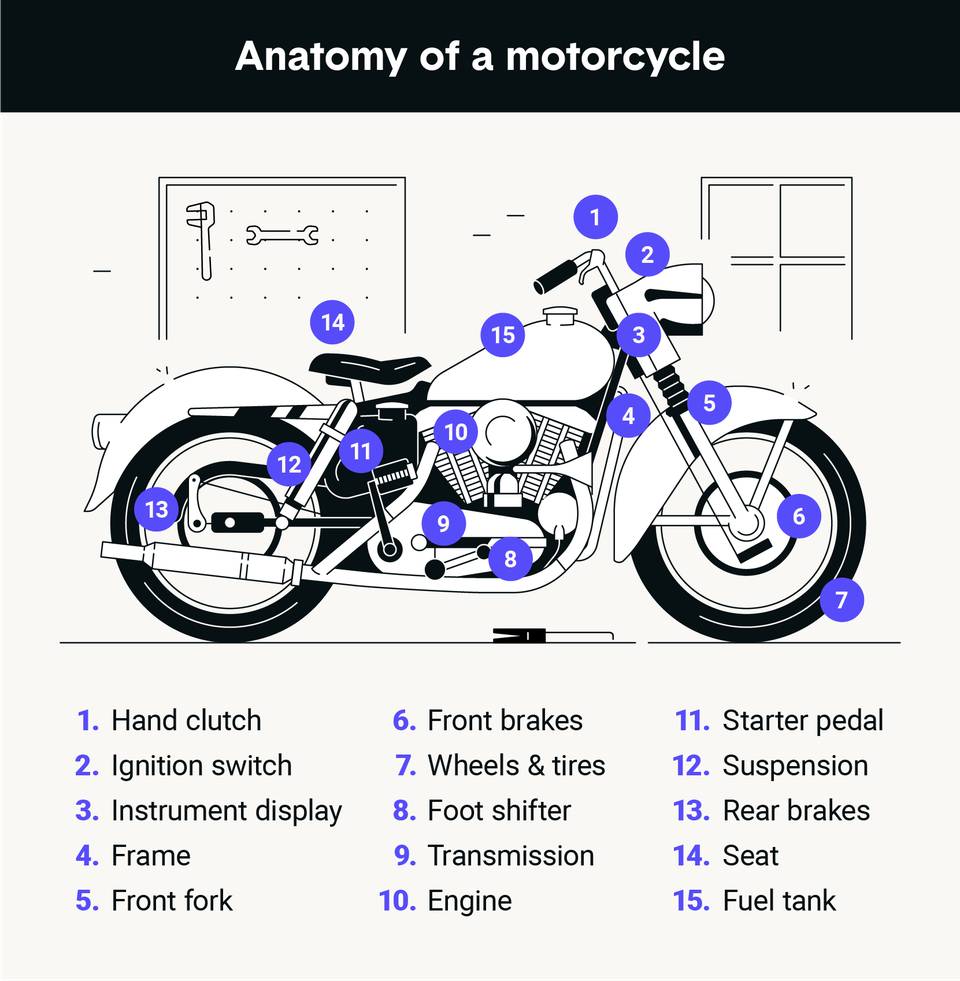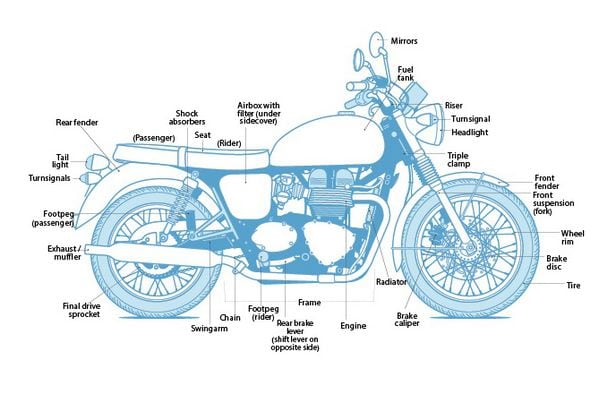Quick Fixes When Your Motorcycle Parts Auckland Start Showing Wear
Quick Fixes When Your Motorcycle Parts Auckland Start Showing Wear
Blog Article
Discover the Essential Motorcycle Parts You Need for Ideal Performance
Recognizing the crucial parts of a motorbike is fundamental for accomplishing peak efficiency. Each part, from the engine to the stopping system, plays a vital duty in total functionality and safety. Routine upkeep can protect against unexpected failings and enhance the riding experience. Nevertheless, lots of cyclists overlook the intricacies of these systems. Uncovering just how they interact can bring about a more efficient trip. What important elements should every cyclist focus on?
The Engine: The Heart of Your Motorcycle
The engine serves as the core component of a motorcycle, driving its performance and defining its capabilities. It is accountable for transforming fuel right into mechanical power, which powers the bike ahead. Numerous sorts of engines are used, consisting of single-cylinder, V-twin, and inline arrangements, each offering distinctive features fit for various riding objectives and designs. The engine dimension, typically gauged in cubic centimeters (cc), considerably influences efficiency, with bigger engines normally supplying even more power and torque.Furthermore, the engine's layout and technology, such as gas injection systems or air-cooling versus liquid-cooling, influence efficiency and reliability. Upkeep is vital for peak procedure; aspects like routine oil modifications and monitoring ignition system warranty longevity. Cyclists commonly consider an engine's responsiveness and smoothness, as these features improve the overall riding experience. Eventually, the engine remains a crucial component that specifies not only the motorbike's performance but additionally the motorcyclist's link to the device.
The Transmission: Moving Gears Efficiently
The transmission plays a vital duty in a motorcycle's efficiency, particularly in the mechanics of gear moving. Understanding exactly how to move equipments efficiently can boost the overall riding experience, while regular maintenance guarantees peak performance. Appropriate focus to these aspects can considerably affect the long life and effectiveness of the bike.

Gear Shifting Mechanics
Smooth equipment changing is important for ideal motorcycle efficiency, substantially impacting both acceleration and control. The auto mechanics of equipment changing include the communication between the clutch, gear bar, and transmission system. When a cyclist involves the clutch, it disengages the engine from the transmission, enabling a gear modification without damaging the elements. A well-timed release of the clutch, integrated with accurate motion of the equipment bar, facilitates a smooth modification in between gears. This procedure ensures that the engine runs within its ideal power band, boosting efficiency. Bike Parts Wellington. Furthermore, comprehending the gear proportions and their effect on speed and torque can aid bikers make educated options during changes, ultimately adding to a more pleasurable and responsive riding experience
Maintenance Tips Importance
Regular upkeep plays a vital function in assuring that the transmission system operates effectively, permitting smooth equipment shifts. Routinely changing the transmission and inspecting liquid is essential, as old liquid can result in raised friction and wear. Furthermore, examining the clutch for wear warranties peak engagement and disengagement, preventing slippage during gear changes. Lubrication of relocating parts is similarly important to reduce friction and boost performance. Bike proprietors ought to likewise monitor for leakages and uncommon sounds, as these can show underlying problems. By sticking to these maintenance ideas, motorcyclists can lengthen the life expectancy of their transmission system, guaranteeing that gear changes stay seamless and adding to the general efficiency of their motorcycle.
The Braking System: Ensuring Security on Every Trip
Braking systems are essential parts that straight influence a motorbike's security and performance. They contain various parts, including brake pads, rotors, calipers, and hydraulic lines, all working together to ensure efficient slowdown. The kind of stopping system-- usually either disc or drum-- influences responsiveness and quiting power.Regular upkeep is vital to support peak performance; worn brake pads can lead to reduced performance and increased stopping distances. Furthermore, the quality of brake fluid ought to be checked, as it can soak up dampness over time, compromising braking efficiency.Riders should likewise take into consideration the relevance of anti-lock braking systems (ABDOMINAL), which stop wheel lockup during abrupt stops, improving general security. Correctly functioning brakes are not simply concerning quiting; they infuse self-confidence in the rider, allowing for much safer navigating via numerous surfaces. Ultimately, a reputable stopping system is crucial for taking pleasure in every ride with satisfaction.
The Suspension: Enhancing Convenience and Control
A well-functioning suspension system substantially adds to a motorcycle's general performance, complementing the effectiveness of the stopping system. The suspension plays a substantial function in absorbing shocks from unequal surface areas, guaranteeing a smoother experience while maintaining tire contact with the roadway. This call is necessary for both stability and control, enabling riders to browse corners with self-confidence and precision.Different kinds of suspension systems, such as telescopic forks or mono-shocks, use differing levels of convenience and handling. Effectively tuned suspension boosts responsiveness, supplying the rider with a much more connected feel to the motorbike. Routine upkeep checks are essential to determine the suspension components, including dampers and springs, are functioning at their ideal. An efficient shock absorber not just elevates the riding experience but likewise adds to the longevity of other motorbike parts by lessening deterioration. Therefore, buying quality suspension is essential for any kind of major motorbike lover.
The Tires: Attaching You to the Roadway
Tires play a necessary role in a motorcycle's efficiency, acting as the primary link between the motorcyclist and the road. Recognizing the different types of tires readily available can greatly impact handling and safety. Furthermore, routine maintenance is essential to guarantee peak tire performance and long life.
Tire Enters Explained
Exactly how do different tire types affect a motorbike's efficiency? Tire kinds play a vital duty in identifying a motorcycle's grip, stability, and handling. Sport tires, created for high performance, deal improved traction and responsiveness on paved roads, visit the site making them optimal for competing and aggressive riding. Conversely, touring tires focus on toughness and comfort, providing a smoother experience for long-distance traveling. Off-road tires, defined by their sturdy walk patterns, master grip on unpaved surface areas, suitable for adventure fanatics. Additionally, dual-sport tires mix qualities from both off-road and on-road classifications, accommodating functional riding demands. Ultimately, choosing the best tire type is crucial for optimizing performance, making sure security, and improving the overall riding experience.
Upkeep Tips Offered
While riding on the road, preserving ideal tire problem is crucial for safety and performance. On a regular basis inspecting tire stress is necessary, as under-inflated tires can cause inadequate handling and boosted wear. It is a good idea to check step depth regularly; worn tires compromise grip and security. Additionally, cyclists should search for indicators of damage, such as lumps or fractures, which can suggest the need for replacement. Rotating tires occasionally ensures even wear, enhancing longevity. Additionally, keeping tires clean from particles and avoiding extreme aesthetics can lengthen their life-span. Maintaining appropriate positioning and equilibrium contributes to peak efficiency, decreasing tension on various other bike components. Following these maintenance ideas will considerably boost the total riding experience.
The Fuel System: Fueling Efficiency and Performance
The fuel system plays an essential function in look at this now maximizing a motorcycle's performance and effectiveness, as it ensures the optimal delivery of gas to the engine. It consists of a number of important components, including the fuel container, fuel pump, fuel filter, and fuel injectors or carburetor. Each part has to operate effectively to guarantee a powerful and smooth ride.The fuel storage tank stores gas and provides it to the engine by means of the gas pump, which creates the necessary pressure. A fuel filter stops pollutants from getting in the engine, while the injectors or carburetor mix gas with air for combustion.Proper upkeep of the gas system is essential; a clogged up filter or malfunctioning injector can bring about lowered efficiency and raised gas usage. By confirming that the fuel system operates successfully, riders can enjoy improved throttle response, far better gas economy, and overall enhanced riding experience.
The Electric System: Powering Your Adventure
An effective electrical system is vital for the general functionality and security of a motorcycle, as it powers essential components such as the ignition, lighting, and various electronic systems. This system consists of the battery, which shops power, and the generator, liable for creating power while the engine runs. The electrical wiring harness links these components, making sure trustworthy power distribution.Additionally, fuses shield the system from overloads, while relays aid manage high-current gadgets with low-power signals. A well-kept electric system boosts efficiency by ensuring smooth beginnings and consistent operation of lights and signals, essential for rider visibility and safety.Regular checks of the battery's charge and links are necessary for preventing electrical failures. Cyclists must likewise check circuitry for damage, making sure all components operate ideally. Inevitably, a robust electric system contributes considerably to the overall performance and reliability of the motorbike.
Frequently Asked Questions
Just how Often Should I Change My Motorbike's Battery?
The frequency of motorbike battery replacement depends upon usage and maintenance (Bike Parts Wellington). Usually, batteries must be replaced every three to 5 years. Routine checks can aid identify when a substitute is essential for peak efficiency
What Tools Do I Need for Basic Motorbike Maintenance?
For standard motorbike upkeep, one requires important tools such as an outlet set, wrenches, screwdrivers, pliers, tire stress gauge, and a torque wrench. These tools help with reliable upkeep and assure the bike runs effectively and safely.
How Can I Boost My Motorcycle's Aerodynamics?
To boost motorcycle aerodynamics, one need to consider readjusting fairings, using windscreen extensions, enhancing body placement, and decreasing overall weight. These modifications help minimize drag, boosting security and fuel effectiveness during click to find out more rides.
What Are the Indicators of a Failing Electric System?
Signs of a stopping working electrical system consist of dimming lights, trouble starting, irregular tool analyses, and blown merges. Oem Parts New Zealand. Uncommon smells or rust around battery terminals may also indicate underlying problems requiring prompt attention for security and efficiency

How Do I Choose the Right Oil for My Bike?
When choosing oil for a motorcycle, one need to consider the producer's specs, viscosity rankings, and the kind of riding. In addition, traditional versus synthetic oil can impact efficiency and engine protection, influencing the choice significantly. The engine dimension, usually determined in cubic centimeters (cc), substantially affects efficiency, with larger engines usually offering even more power and torque.Furthermore, the engine's style and innovation, such as fuel shot systems or air-cooling versus liquid-cooling, impact effectiveness and integrity. A well-functioning suspension system greatly contributes to a motorbike's general performance, enhancing the performance of the braking system. The gas system plays an essential duty in making the most of a motorcycle's efficiency and performance, as it assures the optimal delivery of gas to the engine. A gas filter prevents contaminants from entering the engine, while the injectors or carburetor mix fuel with air for combustion.Proper upkeep of the fuel system is critical; a stopped up filter or malfunctioning injector can lead to lowered efficiency and boosted fuel consumption. A properly maintained electrical system enhances efficiency by making sure smooth starts and regular operation of signals and lights, crucial for rider visibility and safety.Regular checks of the battery's fee and connections are important for preventing electrical failures.
Report this page